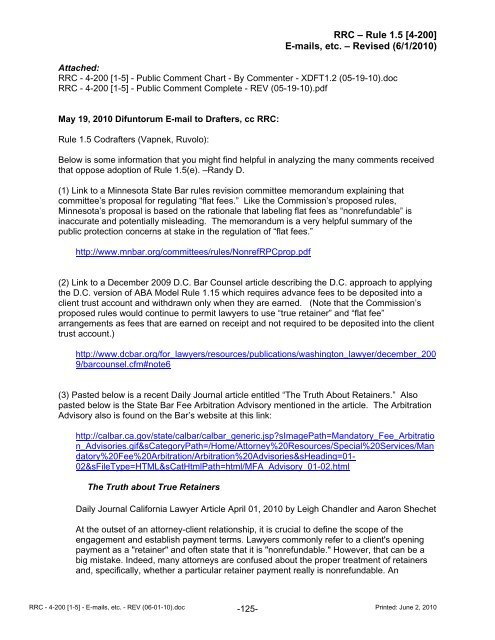Sorted by Commenter - Ethics - State of California
Sorted by Commenter - Ethics - State of California
Sorted by Commenter - Ethics - State of California
Create successful ePaper yourself
Turn your PDF publications into a flip-book with our unique Google optimized e-Paper software.
RRC – Rule 1.5 [4-200]<br />
E-mails, etc. – Revised (6/1/2010)<br />
Attached:<br />
RRC - 4-200 [1-5] - Public Comment Chart - By <strong>Commenter</strong> - XDFT1.2 (05-19-10).doc<br />
RRC - 4-200 [1-5] - Public Comment Complete - REV (05-19-10).pdf<br />
May 19, 2010 Difuntorum E-mail to Drafters, cc RRC:<br />
Rule 1.5 Codrafters (Vapnek, Ruvolo):<br />
Below is some information that you might find helpful in analyzing the many comments received<br />
that oppose adoption <strong>of</strong> Rule 1.5(e). –Randy D.<br />
(1) Link to a Minnesota <strong>State</strong> Bar rules revision committee memorandum explaining that<br />
committee’s proposal for regulating “flat fees.” Like the Commission’s proposed rules,<br />
Minnesota’s proposal is based on the rationale that labeling flat fees as “nonrefundable” is<br />
inaccurate and potentially misleading. The memorandum is a very helpful summary <strong>of</strong> the<br />
public protection concerns at stake in the regulation <strong>of</strong> “flat fees.”<br />
http://www.mnbar.org/committees/rules/NonrefRPCprop.pdf<br />
(2) Link to a December 2009 D.C. Bar Counsel article describing the D.C. approach to applying<br />
the D.C. version <strong>of</strong> ABA Model Rule 1.15 which requires advance fees to be deposited into a<br />
client trust account and withdrawn only when they are earned. (Note that the Commission’s<br />
proposed rules would continue to permit lawyers to use “true retainer” and “flat fee”<br />
arrangements as fees that are earned on receipt and not required to be deposited into the client<br />
trust account.)<br />
http://www.dcbar.org/for_lawyers/resources/publications/washington_lawyer/december_200<br />
9/barcounsel.cfm#note6<br />
(3) Pasted below is a recent Daily Journal article entitled “The Truth About Retainers.” Also<br />
pasted below is the <strong>State</strong> Bar Fee Arbitration Advisory mentioned in the article. The Arbitration<br />
Advisory also is found on the Bar’s website at this link:<br />
http://calbar.ca.gov/state/calbar/calbar_generic.jsp?sImagePath=Mandatory_Fee_Arbitratio<br />
n_Advisories.gif&sCategoryPath=/Home/Attorney%20Resources/Special%20Services/Man<br />
datory%20Fee%20Arbitration/Arbitration%20Advisories&sHeading=01-<br />
02&sFileType=HTML&sCatHtmlPath=html/MFA_Advisory_01-02.html<br />
The Truth about True Retainers<br />
Daily Journal <strong>California</strong> Lawyer Article April 01, 2010 <strong>by</strong> Leigh Chandler and Aaron Shechet<br />
At the outset <strong>of</strong> an attorney-client relationship, it is crucial to define the scope <strong>of</strong> the<br />
engagement and establish payment terms. Lawyers commonly refer to a client's opening<br />
payment as a "retainer" and <strong>of</strong>ten state that it is "nonrefundable." However, that can be a<br />
big mistake. Indeed, many attorneys are confused about the proper treatment <strong>of</strong> retainers<br />
and, specifically, whether a particular retainer payment really is nonrefundable. An<br />
RRC - 4-200 [1-5] - E-mails, etc. - REV (06-01-10).doc -125-<br />
Printed: June 2, 2010












![Proposed Rule 4.1 [N/A] “Truthfulness in Statements to Others” - Ethics](https://img.yumpu.com/19037854/1/190x245/proposed-rule-41-n-a-truthfulness-in-statements-to-others-ethics.jpg?quality=85)



